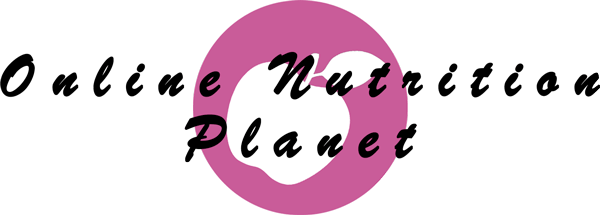It’s safe to say that one of the things most people have in common is that we hope to live long, healthy lives. It’s also well-known that the food we eat and the lifestyle we choose tend to play a pretty big role. But having a holistic approach to health isn’t something that comes naturally to everyone. With the ever-increasing demand in the holistic health market, if nutrition and physical health are a passion of yours, a holistic nutrition certification course may be right up your alley.
Holistic nutritionists work individually or with groups of people to identify areas of concern and assists them in finding ways to improve diet, lifestyle, and mindset to promote and move towards optimal health. If this sounds like your calling, the good news is that it can be done right from your computer.
The 5 Best Holistic Nutrition Certifications Online are:
- Functional Nutrition Coaching from MindBodyGreen
- Health Coach Training Program from Institute for Integrative Nutrition
- Scientific Foundations of Holistic Nutrition from Hawthorne University
- Holistic Nutrition Certificate from ACHS
- Nutritional Therapy Practitioner Program from NTA
Read on for more on how to become a certified holistic nutritionist and the five best holistic nutrition certification programs that will help you achieve your goal.
Article Contents
How Do I Become a Certified Holistic Nutritionist?
To become a certified holistic nutritionist, you must gain extensive knowledge, education, and clinical training so that you can educate and assist others in making the right choices for their overall health. Now, if you don’t have tens of thousands of dollars or 4+ years to spend on education, you’re in luck. A holistic nutritionist certification can offer relevant and focused knowledge for real-world coaching.
Holistic nutrition is centered around the idea that health is an expression of the physical, chemical, mental, emotional, spiritual, and environmental aspects of our being. As such, those who wish to work in this realm approach health and nutrition from a whole-person perspective, and not just with numbers from lab tests.
The first step in becoming a certified holistic nutritionist is finding a high-quality certification course that provides the education you are looking for. These programs range from an online certification to a full-fledged master’s degree, and not all are created equally. You’ll want to make sure to do your research before choosing a program. (Don’t worry, we go into this more below.)
The next step is to decide which job is best for you. There are tons of career paths within the field of holistic nutrition. Some may require more education, while with others, a certification program is all you need. Before jumping in, find out if any specializations interest you so you can plan out any future continuing education.

What Can I Do with a Holistic Nutrition Certificate?
Typically, holistic nutritionists do not require a state license to practice. However, it is recommended that you check with your local and state licensing authorities before you begin offering services to the public. Some states, such as Alaska, Louisiana, Minnesota, New Mexico, Virginia, and the District of Columbia, require licensing or state certification to use the title “nutritionist.”
That being said, holistic nutrition certification prepares you with the in-depth knowledge and understanding required to advise people on how to improve their diet and lifestyle. Depending on the certification you choose and the interests you wish to specialize in, there are many different career and business options you could pursue with your certification.
Some of these options include:
- Natural Chef
- Holistic Healthcare Consultant
- Herbalist
- Health Food Store Manager
- Holistic Nutrition Educator
Holistic nutritionists are also known to work together with licensed practitioners to provide post-diagnosis support and teach preventive habits, leading to improved health and fewer doctor visits.
Services a holistic nutritionist may offer include:
- Advice on healthy eating
- Diet, lifestyle, and mindset evaluation
- Meal planning
- Shopping tours
- Suggestions for stress management
- Provide recommendations for basic wellness supplements
- Review lab assessments
- Work with a licensed healthcare provider to help identify imbalances
- Research previously diagnosed health issues
- Teach classes on basic wellness and nutrition
Remember, holistic nutritionists are not licensed, practitioners. They do not diagnose and treat illness. Instead, they educate and mentor clients to change root behaviors and move towards more health-conscious decisions.
The 5 Best Holistic Nutrition Certifications Online
If you’re interested in becoming a holistic nutritionist, you’re entering the field at the right time. There is an overwhelming amount of information and misinformation available online, and many people are looking for nutritionists and health coaches to guide them in the right direction.
This, unfortunately, applies to nutrition certification programs as well. There are many programs out there that claim to teach the latest techniques and trends but lack the science and data to back up those claims. When looking through programs, it can take a while to research which ones are credible and find the one that will work best for you.
The good news is, we’ve done some of the initial work for you. This list isn’t going to tell you which program you should choose (that’s a choice you’ll have to make on your own), but it will give you a quick breakdown of the five best online holistic nutrition certification programs available so that you can make your decision with more confidence.
1. Functional Nutrition Coaching from MindBodyGreen (MBG)
This program is perfect for those looking to launch their business as holistic nutritionists. Whether you’re looking to start a new career or hoping to expand on the one you have, Functional Nutrition Coaching will take you through a deep dive into research, case studies, and current trends.
| Pros | Cons |
|---|---|
| * Unlimited, lifetime access to the program * Affordable payment plan * Covers branding and marketing material * Cheaper than most programs | * No option for in-person learning * No set time to complete * Requires a solid understanding of basic nutrition |
This program is perfect for those who already have a solid understanding of basic nutrition but are looking to deepen their knowledge in specific areas such as inflammation, autoimmune conditions, and nutritional deficiencies.
This course is also good for those interested in taking their knowledge and passion for functional nutrition and turning it into a thriving wellness business.
MBG uses a 7-point Functional Medicine Approach that forms the basis of their learning. In this program, you can expect to learn:
- Healthy approaches to food and eating beyond popular diets and trends
- What food intolerances look like, and what science has to say about them
- General healing diets for everyday health
- What inflammation is and how to resolve it from a functional food perspective
- The ins-and-outs of gut health
- Nutritional considerations for managing thyroid health
- How nutrition affects the brain
- How to support the endocannabinoid system through diet and lifestyle
- Eating to support your immune system
- How hormones and food work together
- Branding and marketing your wellness business
- How to work with clients
The Functional Holistic Nutrition Certification costs $1,999, which can be split into payments as low as $125. Enrollment includes:
- 24 modules that you have lifetime access to
- Over 26 hours of instructional videos
- In-depth study guides, nutrition charts, and illustrations
- Functional Nutrition Coach Certificate after completion of the final assessment
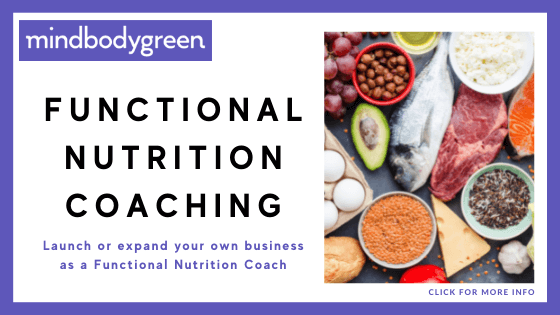
2. Health Coach Training Program from Institute for Integrative Nutrition (IIN)
As one of the first schools to provide any type of health coaching certificate, IIN is well known for its amazing teachers and graduates, as well as its in-depth, science-backed curriculum. The program covers three areas: nutrition, coaching, and business. If you are looking for a program that will teach you the business side of holistic nutrition and how to work with clients, then this may be the course for you.
| Pros | Cons |
|---|---|
| * Two different training programs are available * Largest health coaching program in the world * Offer a fast-track program that can be completed in six months * Licensed by the New York State Education Department * Customizable for in-person or online | * Takes 12 months to complete * More expensive than other programs * Not exclusively a nutrition program * Requires a high school diploma or GED |
IIN’s Integrative Nutrition program is for those who have a passion for nutrition and health coaching and want to make a living doing work they love. This course is heavy in health coaching concepts and business skills, so you should expect and be willing to work with clients one-on-one while learning how to scale your wellness business.
IIN takes a no-one-size-fits-all approach to nutrition and wellness. While in the program, you’ll learn over 100 dietary theories along with the life-coaching skills needed to empower your clients to reach their health goals. Throughout the course, you can expect to learn:
- Key nutrition concepts, theories, and the latest in nutrition science
- The role holistic nutritionists play in healthcare
- The concept of bio-Individuality
- Challenges in nutrition
- Children’s health
- How stress affects your body and diet
- Holistic weight loss and health
- Clean and controversial foods
- Shopping for Whole Foods
- Coaching theories and methods
- Marketing, networking, sales, and brand awareness skills so you can start and maintain your own wellness business
- Bridging the healthcare gap
- How to make money as a holistic nutritionist or health coach
- Treating the cause, not the symptom
IIN’s Health Coach Training Program costs $6,795, which is higher than other programs available, but the investment is worth it for the value of the knowledge you are receiving. They also offer personalized payments plans and occasional discounts with the hope that everyone who wants to join will have the ability to do so.
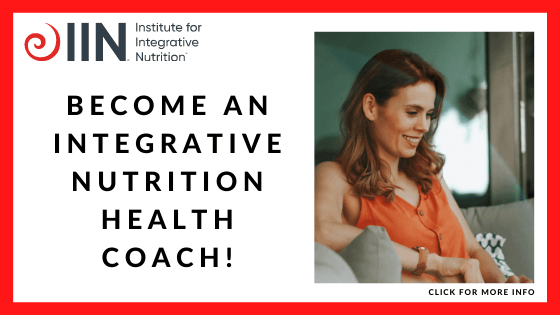
3. Scientific Foundations of Holistic Nutrition from Hawthorne University
This program offered by Hawthorne University provides a student-centered, self-paced learning experience for those looking to break into the field of holistic nutrition. Each assignment is completed online with the support of your teachers and peers right at your fingertips.
| Pros | Cons |
|---|---|
| * Accredited institution * Pay-as-you-go options * Options for continuing education * No prior knowledge of nutrition is necessary | * 24-month program * No in-person option * Requires high school diploma or GED * No focus on business or marketing |
This course is for anyone with a high school diploma or GED who has an interest in becoming a certified holistic nutritionist. Since this program starts off with a deep dive into the basics of nutrition, you don’t need to have any prior knowledge of the topic.
Hawthorne University also offers a Master of Science in Holistic Nutrition program for students are already hold a bachelor’s degree and are looking to expand their knowledge.
Throughout the program, you will use lectures, interviews, textbooks, conference calls, hands-on community-based assignments, and more to learn and apply basic nutritional concepts and coaching skills. In the course, you can expect to learn:
- Basic whole foods nutrition
- Common health conditions related to poor digestive health
- How macronutrients affect the body
- How micronutrients affect the body
- Critical thinking and research skills
- Understanding and determining individual diet and nutrient needs
- Common health conditions associated with each phase of life
- Support strategies for weight management and fitness issues
- Tools and skills for building trust and understanding between you and a client
- Counseling skills
The total tuition cost for the SFHN program is $3,785. However, Hawthorne University allows students to pay by the course, with payment being due upon enrollment into a course. The entire program is split into eight three-credit courses, making this program easily accessible for many.
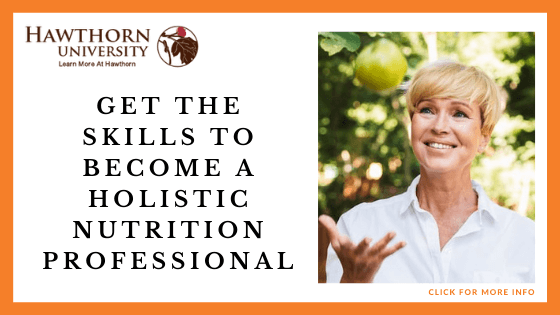
4. Holistic Nutrition Certificate from ACHS
The Holistic Nutrition Certificate program from the American College of Healthcare Sciences (ACHS) teaches students how to educate others on ways to support and rebalance the body using holistic health protocols.
| Pros | Cons |
|---|---|
| * Ability to transfer credits * Accredited thru DEAC * Covers HIPAA, SOAP notes, and ethics * Customizable coursework | * More expensive than other programs * Can take over a year to complete * Doesn’t cover business building techniques |
This course is best for those looking to explore the ways in which health care and integrative health practices work hand-in-hand. Students need to hold at least a high school diploma before enrolling and can expect to be introduced to various principles within the field of integrative medicine.
The Holistic Nutrition Certificate program prepares graduates to provide evidence-based coaching for increased health and well-being. Throughout this program, you can expect to learn:
- How to identify integrative health modalities
- To define and explain different micronutrients and macronutrients
- The basics of digestion and healthy eating habits
- How to use aromatherapy, holistic nutrition, herbal medicine, and other complementary medicine for increased health and well-being
- To identify nutritional deficiency signs in the hair, skin, and nails
- Ethical guidelines and professional standards in healthcare
- Distinguish between coaching, consulting, and other support professions
- How to apply concepts of behavioral change models
- Establish trust and intimacy with clients
- Complete summative projects that draw on current research
- Cite information that addresses state and federal legal issues, professional ethics, and privacy
The total projected cost of the program is $7,383. ACHS offers various funding options, including the ability to transfer in credits, military tuition assistance, and financial aid.
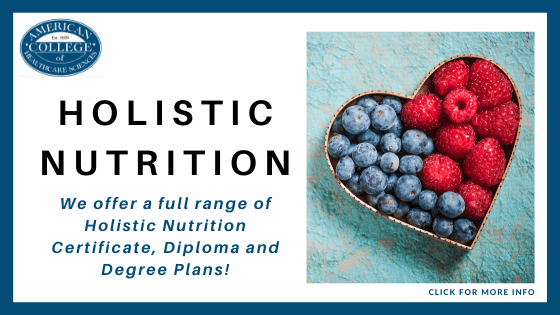
5. Nutritional Therapy Practitioner Program from NTA
The Nutritional Therapy Practitioner program from the Nutritional Therapy Association is a 10-month, instructor-led course that takes a bio-individual approach to holistic nutrition. Recognized by the National Association of Nutrition Professionals, this course takes place completely online and covers the importance of nutrient-dense food and lifestyle choices.
| Pros | Cons |
|---|---|
| * Less than a year to complete * Recognized by the NANP * Interest-free payment plans | Set registration dates More expensive than other programs |
This course is for anyone seeking to heal their own body and possibly turn their passion into a full-time career. Starting with the very basics of nutrition then moving into how each concept works together with our overall health, both beginners and those already working in the field will benefit from the well of information here.
The online program covers a full range of topics in the form of video lectures, required reading, guides, projects, team conference calls, and exams. In this program, you can expect to learn:
- The systemic effects of dehydration on the body
- The impacts of stress, sleep, and movement on overall health
- Basics of nutrition
- Culinary wellness
- An introduction to anatomy and physiology
- The impacts of nutrition and lifestyle on cardiovascular health
- How to develop customized protocols based on each client’s bio-individual needs
- Consultation skills
- Motivational interviewing techniques
- An overview of modern diet trends and farming practices
- The relationship between nutrition and the endocrine system
- How food affects the immune system
- Scope of practice and legal implications
Tuition costs $5,999, which doesn’t include the required texts needed to complete some of the lessons. To make tuition more affordable, NTA offers an interest-free payment plan option. Students can also apply for a partial scholarship award based on financial need.
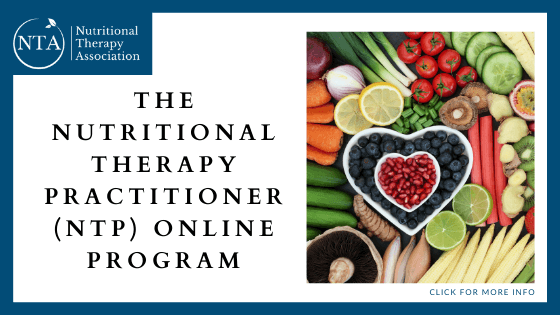
The Final Verdict on Online Holistic Nutrition Courses
Holistic health professionals are the future of healthcare. While physicians diagnose and treat illness, they aren’t typically trained to assist patients in changing their behaviors, and they certainly don’t have the time during brief doctor appointments.
Hopefully, one of these five holistic nutrition certification courses stood out to you and inspired you to get started on your journey towards being a holistic nutritionist. At the end of the day, the program you choose is entirely up to you. Take the time to research each of these options a bit more so that you can narrow down your choices and find the one that works best for you. Here is a list of schools that are recognized by the NANP for you to continue your research.
